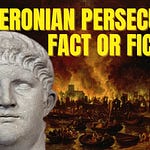
What accounts for the triumph of Christianity over its pagan rivals?
Around about AD 30, Jesus of Nazareth was put to death by a second-tier Roman administrator in the backwater province of Judea. But some two hundred years later, in 312, Constantine was going into battle at the Milvian bridge with the Chi-Rho symbol on the shields of his soldiers because he allegedly had a vision telling him, “In this sign, conquer!”
Then later, in 380, the emperor Theodosius II issued the Edict of Thessalonica, which made Christianity the official religion of the Roman Empire.
How did this happen?
One could appeal to divine providence and purpose, but even then the question is “how,” by what material means did Christianity become so resilient and then hegemonic in the Roman empire?
One conspiracy theory is that Constantine made Christianity the religion of the empire to use Christianity as a tool to control the empire. The problem of course is that Constantine did no such thing. He legalized Christianity, gave it certain privileges, interfered in a few ecclesiastical debates, but otherwise tolerated Jews and pagans. Constantine was unable to unify the church and keep all the bishops on a leash amidst the torrent of debates in the Donatist and Arian controversies.
There were external factors as well that facilitated Christianity’s rise.
The Roman Empire had created a political edifice, a social system, means of travel for establishing trans-provincial associations, that made it possible for religious ideas to spread and networks to be created across Europe, Africa, the Levant, and Mesopotamia.
Also, monotheism was an idea on the rise in different forms in the Greco-Roman world. Devotion to the “Most High God” was known in parts of Asia Minor in the firsts century, Middle Platonists flirted with monotheistic notions in the second century, and there were attempts to import the Syrian god Elagabal into Rome in the early third century. By the late third century, emperors like Diocletian would champion the cult of Sol Invictus, the triumphant Sun, as a supreme deity over others.
Perhaps Christianity was a more inclusive form of Judaism. We know from Philo and Josephus about many pagans who were attracted to Judaism, many adhered to or converted to the Jewish way of life. Maybe Christianity, with its Jewish origins, was a type of Judaism-lite which was even more palatable to pagans, given that Christianity maintained some of the things that made Judaism interesting (its antiquity, monotheism, sacred texts, ethics, sense of solidarity and identity) but divested itself of some elements of Judaism that some found hard to swallow like the requirement of circumcision for men and other things like abstaining from pork.
The famous historian Edward Gibbon attributed the rise of Christianity to the “inflexible and intolerant zeal of the early Christians.” In other words, the early Christians were religious nutjobs who wouldn’t shut up or give up.
To read further, consider joining the “Aviary” by taking out a paid subscription, only $7 per month or $75 per year, supports me in my ministry and scholarship, and gets you 4-5 posts per week on biblical studies, Christianity and gender relationships, cultural commentary, book reviews, previews of my forthcoming books. Also, access to exclusive content in the Paideia Academy, which includes my video lectures on several topics.
Paula Fredriksen in Ancient Christianities has recently argued that what really made a difference was “the strong institutional organization, centered around the bishop, that emerges clearly by the mid-third century.” For Fredriksen, “It was the church of the bishops that captured Constantine’s allegiance” since “Bishops by that point had weathered the storm of occasional state coercion, whether through resistance, subterfuge, or acquiescence.” And the bishops became “the executives of a movement … that cultivated a broad social reach.”
For my mind, the best argument for that view is somewhat parallel to the European Reformation, where we learn that religious revolutions tend not to be top-down or bottom-up, but succeed when the middle management of a kingdom or empire latches onto an idea, a trend, a movement or network, and then become the movers and shakers behind it.
Many bishops in the third century were either from the elite class or were at least literary elites, experts in rhetoric, law, and philosophy.
But that itself raises the question, why did the middle managers and intellectual class of the empire become attracted to Christianity?
I do think the figure of Jesus as a teacher, miracle-worker, and healer was important, even though there were other miracle-workers and teachers in antiquity, Jesus simply appealed to more people.
I am inclined to believe as well that Christianity introduced a moral and social revolution, introducing virtues like humility, opposition to gladiatorial contests, infanticide, and abortion, and championing asceticism over licentiousness. It also had an acute focus on the vulnerable and helpless. Celsus derided Christianity as a religion of “slaves, women, and children,” which is exactly why it stood out. It was a religion that said God was on the side of the lowly, despised, and dispossessed. And yes, I know, not all Christians were ethically rigorous and there were ethically austere pagans. But slaves and masters as “one in Christ” and God was the champion of the poor and conqueror of the mighty, that could appeal to a lot of people. Julian the Apostate, the emperor who tried to take the empire back to paganism from Christianity, complained that the church had a monopoly on the charities sector.
Fredriksen’s proposal reminds me of Walter Bauer’s thesis about Christian Origins where it was the Roman bishops who really called the shots, defined orthodoxy, and made the changes that lasted.
But the problem there is that it over-emphasizes the power of bishops, especially the bishop of Rome. We have to be careful not to read medieval notions of bishops wielding prince-like power and the magisterial papacy into late antiquity.
We have to ask why Christianity also spread in places without Roman imperial sponsorship, like Ethiopia, into Parthia, Persia, India, and Eurasia. Despite competition from Manicheanism, Zoroastrianism, Buddhism, and other local cults and deities, Nestorian and Monophysite Christianities gained converts and became influential in regions outside the Roman empire. Indeed, there would several Christian dioceses from Baghdad to Beijing and universities in northern Iraq and Persia over the next half millennium.
In any case, I’m reminded of the famous words of Will Durant, whether you think it is accurate or not:
“There is no greater drama in human record than the sight of a few Christians, scorned or oppressed by a succession of emperors, bearing all trials with a fierce tenacity, multiplying quietly, building order while their enemies generated chaos, fighting the sword with the word, brutality with hope, and at last defeating the strongest state that history has known. Caesar and Christ had met in the arena, and Christ had won.”
―Will Durant
But what do you think? What do you think that Christianity succeeded in taking over the Roman empire?













Share this post